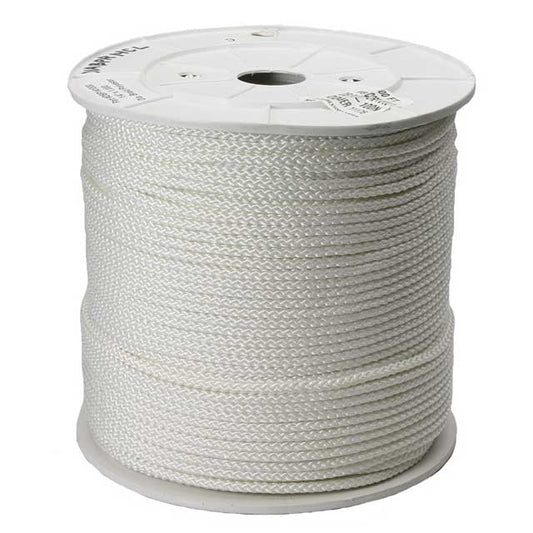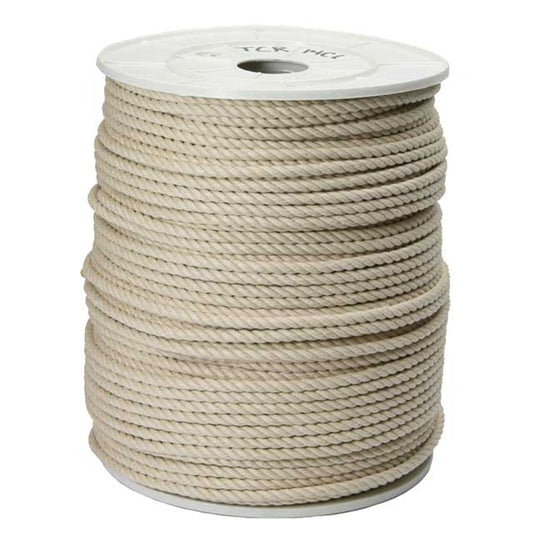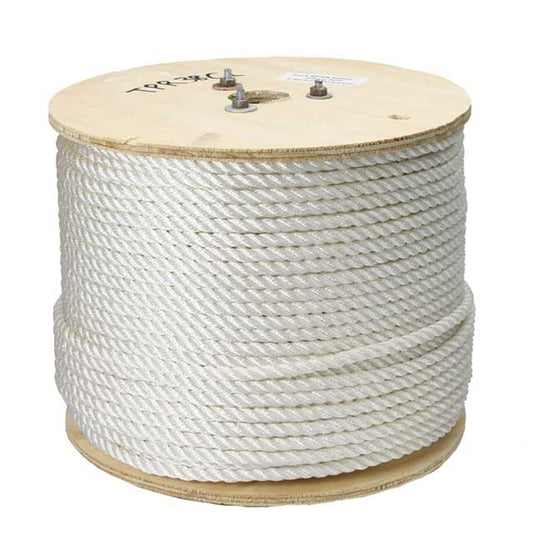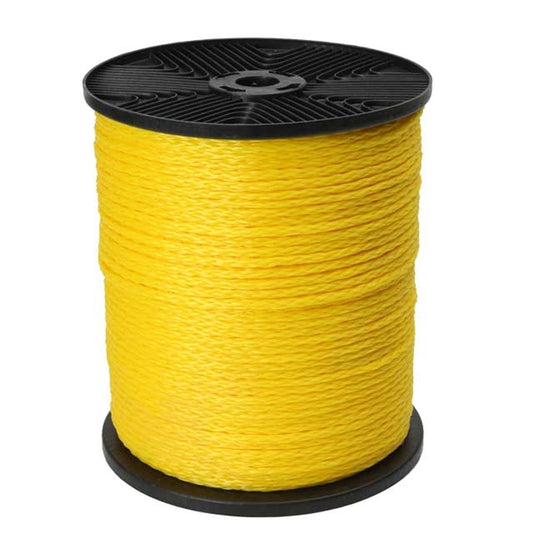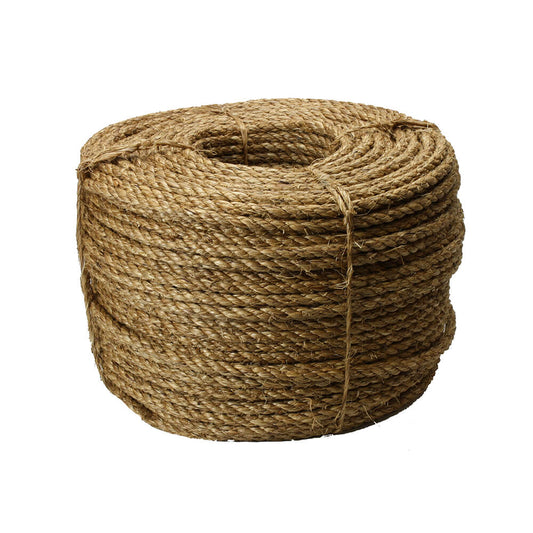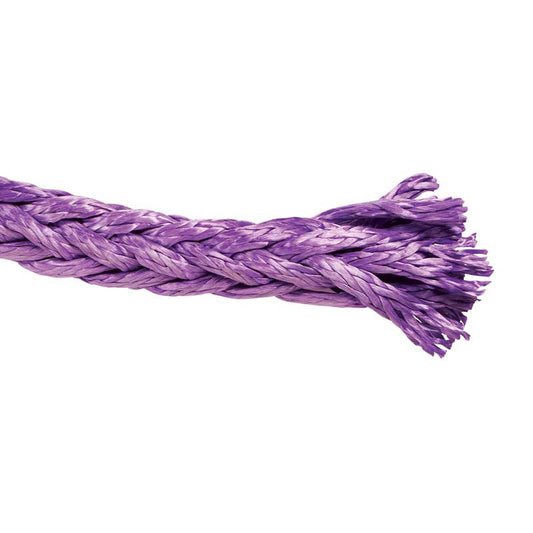Rope & Cordage
Industrial & General Purpose Rope
Rope / cordage is a versatile tool that can be used in a wide variety of applications. From industrial jobsites - where it can be used for lifting slings, safety lines, or rigging - to smaller commercial uses such as landscaping or railings, rope offers reliable performance at competitive prices.
Rope can be divided into two general categories: natural and synthetic (man-made).
Tensile Strength
Depending on the size, material, and construction, the strength of each rope varies. We've listed tensile strengths where applicable, but it's important to remember that tensile strength is not the same as the working load limit.
Tensile strength is the average strength of new rope when tested under controlled lab conditions. Generally, a working load limit can be anywhere from 5-20% of the tensile strength depending on the age and condition of the rope.
Synthetic Rope Breakdown
Synthetic ropes include nylon, polyester, and polypropylene - all of which are stronger, more durable, and more resistant to abrasion, acids, mildew, and rot. They are also generally more cost-effective since they have a longer useful life than natural ropes, and they are lightweight yet strong - ideal for towing and rigging, safety lines, nets, and snow and water uses.
Check out our handy chart below to find the best synthetic rope for your application:
| Feature | Nylon Rope | Polypropylene | Polyester |
|---|---|---|---|
| Stretch / Elasticity | High | Moderate | Low |
| Water Resistance | Moderate | High | High |
| Rot / Mildew Resistance | High | High | High |
| UV Resistance | Moderate | Moderate | High |
| Abrasion Resistance | High | Moderate | High |
| Chemical Resistance | Moderate | High | High |
| Dielectric Properties | Low | High | High |
Polypropylene
Polypropylene rope is generally the least expensive of the synthetic choices on the market. Lightweight, strong, and economical, polypropylene rope is a great choice for jobs, hobbies, and recreational use around water as it floats on the surface and won't sink.
This buoyancy also gives it good dielectric properties, which means it won't conduct an electric current if it touches a live electrical wire, so it's a great choice to use if you're working around utility wire, trimming trees, etc. Because it does not absorb water, it has excellent resistance to mildew, rot, petroleum products, marine organisms, acids, and alkalis.
Polypropylene cordage is a cost-efficient choice for many applications, but it can be uncomfortable for jobs that require constant handling due to its stiffness. It's weaker than polyester or nylon and can deteriorate more quickly; it's also susceptible to gradual elongation when under load.
Choose from California truck rope, hollow braid, or twisted polypropylene rope options.
Best for: Water & Snow Ski Rope, Pool Rope, Construction Barrier Rope, Electricity Utility Rope.
Nylon
Nylon rope - available with braided, diamond braided, or twisted construction - is an extremely strong and durable rope due to its ability to stretch - it can absorb shock loads that might break other types of rope. This makes it extremely versatile and useful in applications ranging from rodeos to safety lines.
With a smooth surface that won't twist or unravel, nylon rope generally wears very well in tough conditions and has a high resistance to abrasion. Unlike polypropylene, nylon cordage does absorb some water - when wet it has approximately 10-15% less strength. This effect is so minor is it still widely used for water applications such as anchor and mooring lines, and it does regain the lost strength when it dries.
Even though it absorbs water, it's resistant to mold, mildew, and rot, as well as most alkalis, petroleum products, and marine growth. It's resistant to weak acids, but can be degraded by strong, concentrated ones.
Best for: Mooring Lines, Sling Rope, Net Rope, Tie Downs, Tow Lines, Safety Lines.
Polyester
Polyester rope has many of the same properties of nylon rope, including excellent resistance to abrasion, but it's not as stretchy. This lack of elasticity makes it ideal for situations where stretch would be dangerous.
One of most valuable properties of polyester is that it's unaffected by water, so it retains its strength even when wet. This also makes it extremely resistant to mold, mildew, rot, and organic solvents.
Although polyester is not quite as strong as nylon, it does offer superior resistance to heat and is great for outdoor use because it has a high resistance to UV rays, so it won't yellow or weaken with extended exposure to sunlight.
Solid braid, diamond braid, and twisted construction are some of the most popular polyester rope options.
Best for: Antenna Guidelines, Tug Lines, Barge Tow Lines, Rigging, Tree Rope, Safety Lines.
Plasma
Plasma rope is made from High Modulus Polyethylene that's been reinforced using a recrystallization process. It's lightweight (especially compared to wire rope), water-resistant, flexible, and strong.
It comes with either a 12 strand or 12x12 strand construction.
12 Strand is best for: Mooring Lines, Lifting Slings, RV Winch Lines, Pulling Lines, Theatrical Rigging, Inland River Barge Lines, Utility Winch Lines.
12x12 is best for: Tug Vessel Assist Lines, Mooring Lines, Offshore Workings, Lashings.
Natural Rope Breakdown
Natural ropes include cotton and manila. They are generally softer, absorbent, and good for uses where it will be handled directly - climbing, flag poles, obstacle courses, pet products, tents, hammocks, awnings, etc. It's also very visually attractive, making it a good choice for landscaping and hand rails.
Because they absorb water they are more prone to mildew, rot, and general decomposition, especially if stored away when they're wet.
| Feature | Cotton | Manila |
|---|---|---|
| Stretch / Elasticity | Low | Moderate |
| Water Resistance | Low | Low |
| Rot / Mildew Resistance | Low | Low |
| UV Resistance | Moderate | Moderate |
| Abrasion Resistance | Low | Moderate |
| Chemical Resistance | Low | Low |
| Dielectric Properties | Low | Low |
Cotton
Cotton rope can be made of either 100% cotton yarn or a cotton/polyester blend. Like its namesake fabric, cotton is softer to the touch than many other choices, so it's great for uses that require handling.
It offers moderate UV-resistance, but like all natural fibers, it's susceptible to deterioration from the elements and can dramatically lose its strength over time. It is also prone to mold, rot, and mildew, especially if it's damp for long periods.
Choose from either solid braid or twisted construction.
Best for: Tents, Hammocks, Halters, Harnesses, Awnings, Pet Toys.
Manila
Manila rope gets its name from its place of origin: the Philippines. Manufactured from the abaca plant that's native to the country, it's a good general-purpose rope for uses that require durability, strength, and cost efficiency.
It's commonly used for activities where direct handling is required, such as for climbing, obstacle courses, tug of war games, etc. Manila ropeis very visually appealing and offers moderate UV-resistance, so it's also a popular choice for decorative landscape uses.
Best for: Tug-O-War, Landscaping, Ladders, Railings, Obstacle Courses.
Rope Construction
There are two basic types of cordage construction: braided and twisted.
Braided Ropes
Braided rope is more durable and stronger than an equivalent size of a twisted version. It also doesn't stretch as much as a twisted rope and its thicker design makes it more difficult to splice.
Some of the most common braids are a diamond braid, a solid braid, or a hollow core braid. A solid braid maintains its shape well, while a hollow core braid is more lightweight.
Rope Twisted
Cordage that's twisted is recognizable by its spiral shape. It is easy to splice, but has some inherent torque, which can create a tendency to rotate and kink when under load. We carry twisted cordage made from a number of different materials, including nylon, cotton, polyester, and polyethylene. We even carry twisted combination rope.
Questions?
If you have questions about which rope or cordage would work best for your needs, call our product specialists. They'll be glad to answer any questions you have, and can also help place an order for you.
And be sure to check out the rest of our cargo control solutions for trucking and lifting and rigging equipment.

